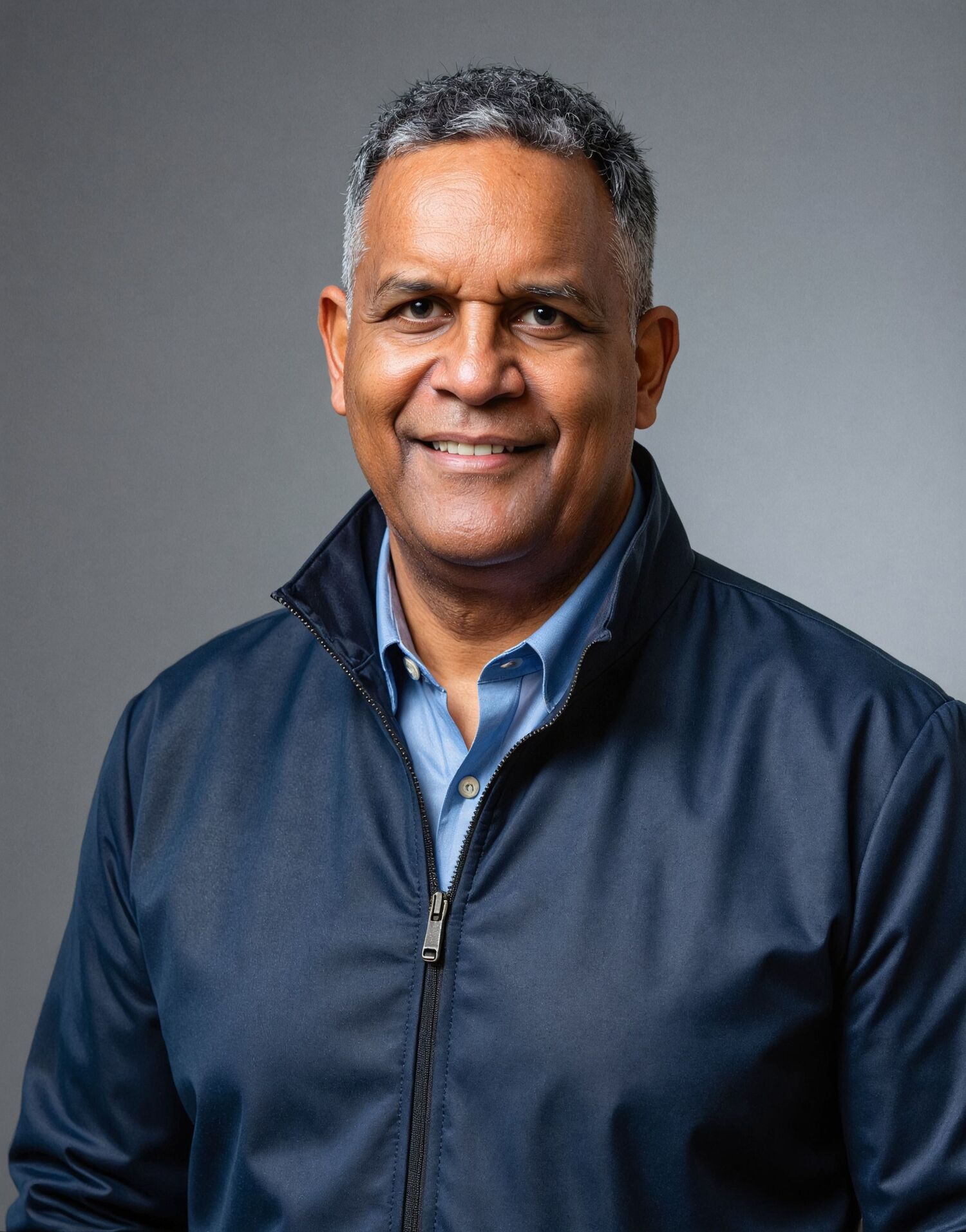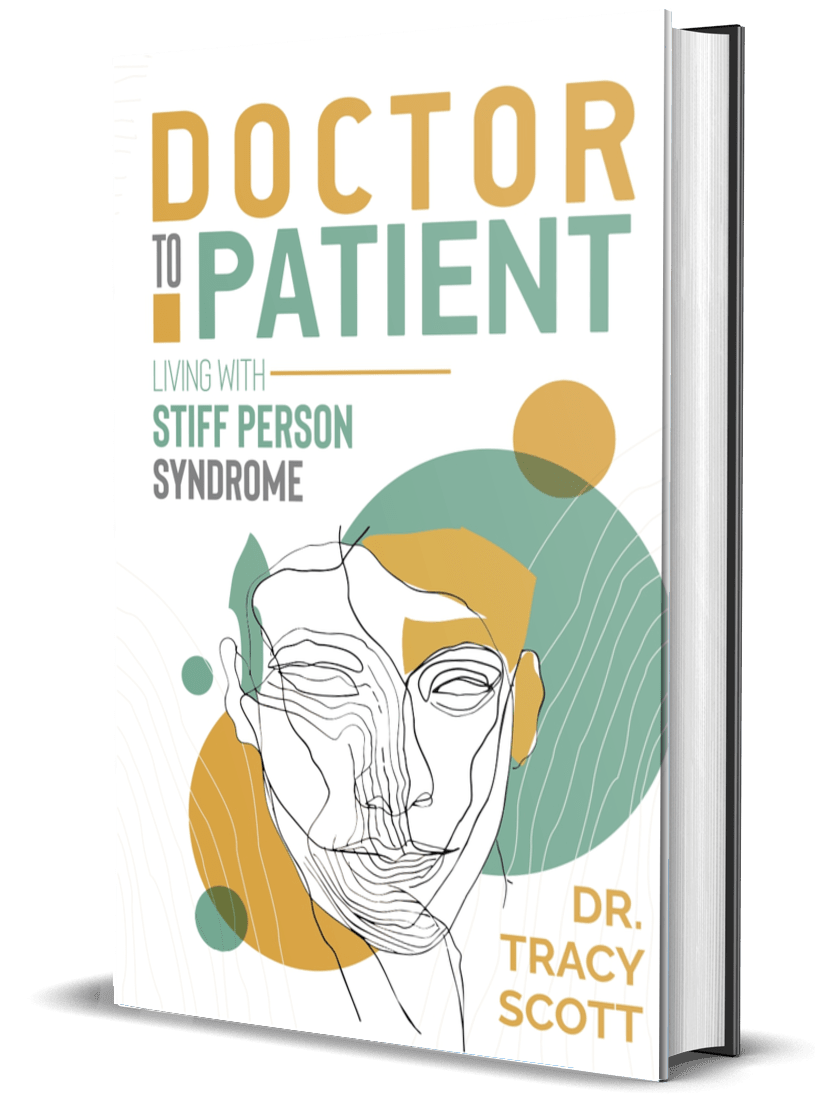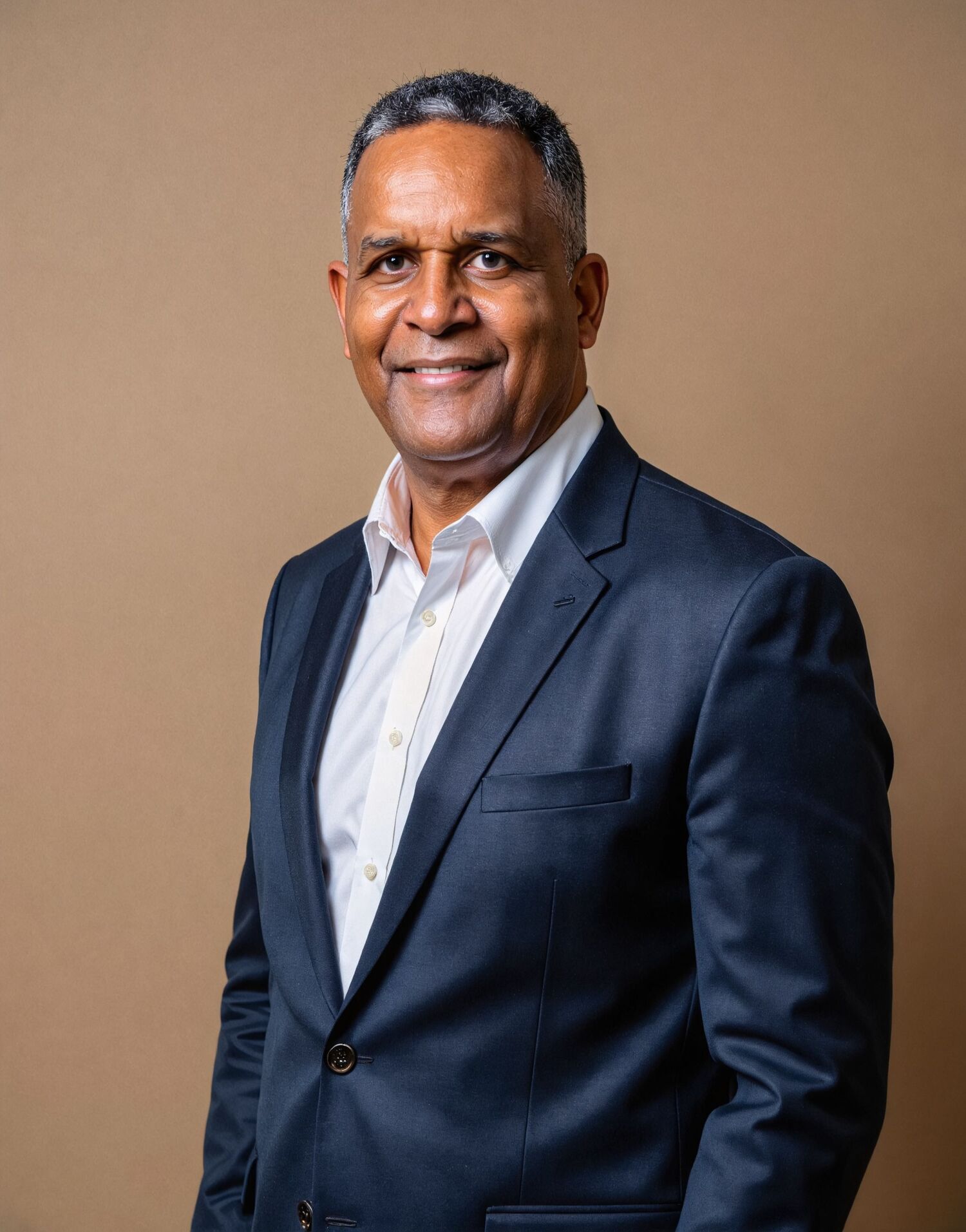Media Kit
- Home
- Media Kit
Dr. Tracy Scott Photos
Tracy Scott dedicated years to rigorous education and tireless training in clinical psychology, becoming a highly respected professor committed to helping others with chronic disorders. But in 2017, he found himself as a patient facing a very rare and incurable illness, “Stiff Person Syndrome” (SPS). After enduring years of inconclusive diagnoses, he finally had an answer, the question now was, what to do about it? Now thrust into the forever patient role, Tracy shares his journey and the importance of finding purpose in adversity.



In his book, “Doctor to Patient: Living with Stiff Person Syndrome,” Dr. Scott recounts his transformation from a doctor to a forever patient learning to navigate the unknown. Many people in this position feel helpless and give up, but he shows readers how to find purpose in their journey and use their experiences to help others going through similar challenges.
Through his personal story and insights, Tracy guides readers toward finding comfort and meaning in their struggles with SPS and other chronic health conditions. He reminds us that the revelation you will discover is not so you can keep it to yourself but, more importantly, so that you can provide the same measure of comfort, empathy, and compassion to others.
Each chapter features a Learning and Discussion Section, empowering readers to integrate the lessons into their lives and build confidence in overcoming challenges. Acknowledging the mystery surrounding SPS, Dr. Scott also provides an array of resources for those seeking further information, ensuring that no one has to embark on their journey alone.
Special requests for signed copies Doctor to Patient: Living with Stiff Person Syndrome can be made at:
- WORDEEE
- Toll Free Number
- +1 888-299-8220
- (9:00am–5:00pm PT, Monday–Friday)
- https://www.wordeee.com/
- contact@wordeee.com
Publicist
- For more information contact:
- Lydia Davis Eady
- Joy Communications
- 312-866-6513
- mauilde@yahoo.com
Book Jackets
To download any book covers in full resolution, right-click on the jacket image.



Dr. Tracy Scott’s book Doctor to patient, is an honest story of the journey of a brilliant mind that was force to transform from being the authority in giving advice and solace to patients to accepting a condition that would change his life on this earth forever. It’s a story of resilience, humility and purpose.
They are books written from the patients perspectives about their medical journey and books written from the doctor’s point of view, but to see the evolution of a doctor into a patient and to learn about the fears and challenges from both sides and how they are different from one another and the fear of having so much knowledge as doctor on the theory of a disease like Stiff Person Syndrome but having to walk the path as a patient and still having the courage to share the experience for all those out there in fear, is not only brave but honorable.
Dr. Ricardo Duncan, MD
Founder and CEO of Smart Clinic & Lab
Long Bio
Tracy Scott, Psy.D., is a celebrated lecturer, scholar, and teacher who has been lauded internationally throughout many communities for his contributions to helping those most in need benefit from a holistic approach to human development and mental and spiritual health.
Dr. Scott earned his doctorate in clinical psychology from the Alfred Adler Institute of Chicago (now Adler University). He completed his internship in clinical psychology at the Minirth-Meier Clinic in Wheaton, Illinois and also completed a two-year post-doctorate fellowship in clinical neuropsychology at Schwab Rehabilitation Hospital in Chicago, Illinois.
With additional advanced education and training in psychopharmacology and clinical spiritual counseling, Dr. Scott has written several articles on a variety of topics and hosted various radio programs. He has created and hosted national radio programs such as Wisdom for Joyous Living, Ask the Doctors, and Life Perspectives. For several years, he was a featured weekly guest on WGLB AM 1560, Milwaukee, WI; KAVH 101.5 FM, Eudora, AK and Internet Radio.
Throughout his professional career, he has delivered presentations and facilitated discussions across the country and internationally on a range of significant topics, including “Where the Mind Goes, Behavior Follows,” “Phantom Limb Syndrome,” “Strokes and Hypertension,” “Cancer and African Americans,” “Treatment of Hyperglycemia and Managing Weight Gain with the Use of Atypical Medications,” “Managing Stress,” “Sexual Dysfunction,” “Spinal Cord Injury,” “Psychological Aspects of Traumatic Brain Injury,” “Overcoming Anxiety and Depression,” “Post Traumatic Stress Disorder the Result of Genocide,” and “Understanding and Managing Unwanted Thoughts.” His work encompasses various aspects of mental, biopsychosocial, and spiritual health issues, reflecting a deep commitment to enhancing understanding and awareness in these critical areas.
Additionally, as an active member of his community, he has published and provided resources on:
- Tips for Managing Stress
- Domestic Violence: The Problem We Refuse to Face
- Growing Through Adversity & Plagues
- Strategies for a Successful Marriage
- Encouraging Hope for Substance Abusers and Their Families
- Coping with Chronic Illness with Faith and Prayer
- Life on a Roller Coaster: Managing Diabetes
- Suicide: A Challenge to Ministry
- How to Prevent Yourself from Singing the Holiday Blues
Dr. Scott is a retired Senior Lecturer at Loyola University Chicago. He resides in southwest Florida with his supportive and creative wife, Denise.
Diagnosed with Stiff Person Syndrome (SPS) in 2017, he has dedicated his life to helping others living with SPS or other chronic illnesses. He enjoys practicing tai chi, biking, maintaining a whole-food, plant-based lifestyle, and listening to jazz.
Short Bio
Dr. Tracy Scott, Psy.D., is a distinguished lecturer, scholar, educator, and clinician recognized internationally for his significant contributions to the promotion of a holistic approach to human development, mental health, and spiritual well-being. He has created and hosted several national radio programs, including “Wisdom for Joyous Living,” “Ask the Doctors,” and “Life Perspectives.” For several years, he was a featured weekly guest on WGLB AM 1560, Milwaukee, WI; KAVH 101.5 FM, Eudora, AK and Internet Radio.
Dr. Scott has delivered numerous presentations nationwide and led discussions on a range of topics pertaining to mental, biopsychosocial, and spiritual health issues. He is a retired Senior Lecturer at Loyola University Chicago.
Following his diagnosis of Stiff Person Syndrome (SPS) in 2017, he has committed himself to assisting individuals living with SPS and other chronic illnesses. His personal interests include practicing tai chi, cycling, and listening to jazz music.
Book Trailer
Spotlight Interview with Wordeee
Publishing. Date: March 2025
What inspired you to write Doctor to Patient: Living with Stiff Person Syndrome, and how has your experience as both a doctor and a patient shaped your perspective on SPS?
I felt that it was essential to write a book that would serve as a lifeline for those grappling with Stiff Person Syndrome (SPS) and for the loved ones who stand by their side—spouses, relatives, and friends. Chronic health conditions like SPS don’t just challenge the individual; they ripple out, affecting every corner of their life and the lives of those nearby.
I wanted to make a meaningful difference for those living with SPS, which requires a deep understanding of how this condition permeates every facet of their lives. Yet, even with my years of education, rigorous training, and experience as an SPS patient, given the rarity of the syndrome, I sometimes question whether such an understanding is even possible.
The recent documentary on Amazon Prime, I Am: Celine Dion, has cast a spotlight on Stiff Person Syndrome. Until now, many people were unfamiliar with SPS. Can you explain the biggest misconceptions about the condition and what you hope readers take away from your book?
The documentary was both heartbreaking and raw, exuding sadness yet filled with hope. Witnessing her determination to lead a meaningful life and not let the syndrome defeat her was inspiring. Her words resonated with the Stiff Person Syndrome community. I’ve been part of this group since 2017, and like other members, I completely understood her struggles.
One of the most eye-opening revelations is realizing that Stiff Person Syndrome (SPS) is invisible to the naked eye. It is a chronic, unseen condition that remains unnoticed unless there are visible spasms or severe stiffness. Just by looking at me, you wouldn’t grasp the daily challenges I face because the disease is not apparent to others. Invisible conditions are often misunderstood by loved ones and dismissed by family, friends, and even the medical community. Since SPS symptoms are not always visible, people tend to assume the signs are fabricated or imagined. After all, seeing is believing, right? Hopefully, besides highlighting SPS, the book dispels misconceptions and the pressure to prove that one is truly ill.
As a medical professional, how did your diagnosis change your approach to interaction with others and advocacy for rare diseases?
In my situation, it took over ten years of medical tests and visiting numerous specialists before the diagnosis of Stiff Person Syndrome was made. It’s crucial to reduce the time it takes to diagnose such conditions. Many people with rare diseases often encounter major challenges, such as delayed diagnosis, limited treatment options, a lack of awareness among healthcare professionals, and funding cuts in research, resulting in slower progress in the development of new treatments, causing compromised health and quality of life. While awaiting help, some people with rare diseases may give up or spiral into deep depression, producing an escalation in symptoms. Ultimately, I have a clearer understanding that advocating for rare diseases ensures that, even though these conditions affect a small group of people, patients must still receive the necessary support and attention they deserve. It’s inhumane to do anything less. No one deserves to be forgotten.
What were some of the biggest challenges you faced while writing this book, both physically and emotionally?
Writing this book was a toilsome and arduous process that occurred in various places. I wrote while lying in bed, riding in the car, taking short walks, watching movies, and tapping away on my cell phone. I wrote whenever I could. Notes were all over the office floor, taped to the wall, and scattered across my desk. On some days, I ended up overworking myself, and I would have to take a break for several days or even weeks.
Then, at times, the spasms would be so severe that I was unable to organize my thoughts. These stretches made it impossible for me to work on it, and weeks would pass between attempts. On occasions, the physical pain of the spasms weighed so heavily on me that, during my toughest moments, I found myself contemplating giving up on the project entirely, feeling incapable of ever finishing it. But I refused to give up. I knew that the information was important. Nonetheless, one day, it was done.
What advice would you give to others living with chronic diseases, Stiff Person Syndrome or rare diseases in general, especially when navigating the healthcare system?
Throughout your life, you’ll face moments when crucial health decisions are necessary. During such times, having a doctor who is compatible, skilled, and devoted—showing honesty, compassion, empathy, and respect—can be invaluable. The partnership between you, as an informed patient, and a dedicated physician can significantly enhance, reduce, or resolve various health issues. However, locating a doctor with these attributes can be challenging and time-consuming. Despite this, as the leader of your healthcare journey, the ultimate choice is yours on who will deliver the care you deserve. Remember, this concerns your health and well-being. Don’t let a single doubtful opinion deter you from exploring all possible options for managing your health and finding relief. With determination and persistence, you can find a healthcare provider who aligns with your vision of holistic healing.
What is your philosophy for daily life?
Focus more on discovering your purpose and less on dwelling on your trauma. The pain and discomfort are real; acknowledge them but don’t allow them to define you. The insights you gain are not just for your benefit but, more importantly, to offer comfort, empathy, and compassion to others. The important thing is to understand that your life, like all lives, holds meaning and purpose. Life seldom unfolds as planned.
Media Kit Contents
Chicago Defender Newspaper
Dr. Tracy Scott, a Black man from Chicago’s West Side, is one in a million. That’s not hyperbole. He shares a rare autoimmune disorder with global pop icon Celine Dion—Stiff Person Syndrome (SPS)—a condition that affects roughly one in a million people.
SPS is marked by painful spasms and severe muscle stiffness. But Dr. Scott is quick to point out the distinction.
“My experience with these spasms,” he says, “is that it’s as if someone takes a vice grip and places it on your leg, and they start turning that grip, and they don’t let go, and they don’t stop.”
“It continues to twist and contort your body until your bones actually break. That’s the difference.”–read more here
